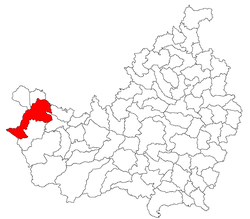Poieni, Cluj
| Poieni | |
|---|---|
| Commune | |
 Location of Poieni |
|
| Coordinates: 46°55′11″N 22°51′55″E / 46.91972°N 22.86528°ECoordinates: 46°55′11″N 22°51′55″E / 46.91972°N 22.86528°E | |
| Country | Romania |
| County | Cluj County |
| Component villages | Bologa, Cerbești, Hodișu, Lunca Vișagului, Morlaca, Poieni, Tranișu, Valea Drăganului |
| Population (2011) | |
| • Total | 4,724 |
Poieni (Hungarian: Kissebes; German: Klein Weichselburg) is a commune in Cluj County, Romania. It is composed of eight villages: Bologa (Sebesvár), Cerbești (Kecskéstanya), Hodișu (Hodosfalva), Lunca Vișagului (Viságmező), Morlaca (Marótlaka), Poieni, Tranișu (Tarányos) and Valea Drăganului (Nagysebes).
Bologa (Latin: Resculum; Hungarian: Sebesvár) is a village in the Poieni commune, with a population of 687 people (2002).
The village is situated at the confluence of the Crişul Repede and Henţ (Sebeş or Săcuieu) rivers (the confluence is known as "gura apelor" - "the mouth of the waters" - in the local toponymy) and at the foot of the Vlădeasa mountains (1863 m), part of the Apuseni Carpathians. The closest town is Huedin.
Transportation links: on the European route E60. Small railway stop ("haltă") for regional trains ("Personal") on the Oradea-Cluj-Napoca main Romanian railroad. On the national road 128 which heads South towards Săcuieu.
4000 years old artefacts (stone axes) were found at the place called "Drumul găunos" ("Potholed Road").
A Roman castrum called Resculum is the oldest documented settlement in the area. It was built around 106 AD, as a garrison for the “II Cohortis Hispanorum” (see Dux), whose mission was probably to defend the Roman Empire's border. As the Romans tried to tighten their hold on the region during the 2nd century A.D., they brought in colonists to the village from Greece, possibly from Patras.
...
Wikipedia
